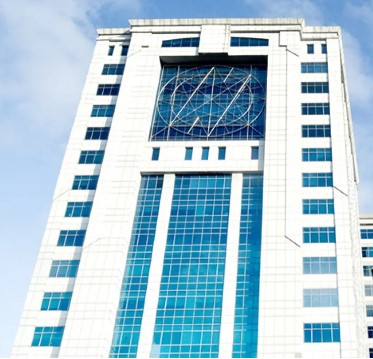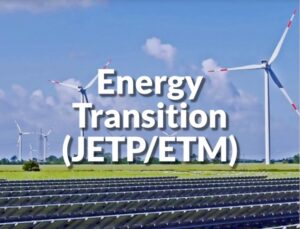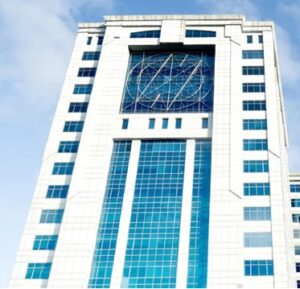
Finance Ministry office in Jakarta
STRATEGIC ASSESSMENT. China’s TikTok has agreed to spend USD840 million to buy most of Indonesian tech conglomerate GoTo’s e-commerce unit – a move that appears to allow it to restart its online shopping business in Southeast Asia’s largest economy. It also said it will invest further in the business, Tokopedia, which is Indonesia’s biggest e-commerce platform, for a total outlay of USD1.5 billion (IDR23.38 trillion). Under the deal, GoTo said that Tokopedia will operate and manage the shopping feature in the TikTok Indonesia app.
Shopee, the e-commerce arm of Southeast Asian tech giant Sea Limited, may face “greater pressure” from the combined forces of GoTo’s Tokopedia and TikTok in Indonesia, analysts said. “We feel that the transaction may also place greater pressure on Shopee as it is also struggling to maintain profitability,” said Kai Wang, senior equity analyst at Morningstar.

Communications and Information Minister Budi Arie Setiadi called on the e-commerce platform, TikTok Shop, which resumed its operation on Dec. 12, to limit selling imported goods. “As long as it complies with the laws and regulations, we support it. However, do not sell many imported goods, (as) the government will monitor it.
It will be a loss for our micro, small, and medium enterprises (MSMEs),” he noted in an event on Wednesday. Setiadi said his team would monitor and remind the platform to not sell many imported goods through the e-commerce platform that is currently partnering with PT GoTo Gojek Tokopedia Tbk (GoTo).

The collaboration between TikTok and GoTo means that the shopping service feature in the TikTok application in Indonesia is now operated and managed by Tokopedia.
In October, Indonesia, another big and promising market, shut down TikTok’s fledgling but lucrative sideline of selling goods via its videos, by requiring social-media firms to obtain an e-commerce licence — with no guarantee of success.
Such obstacles have forced TikTok to act strategically, for instance by moving its global headquarters to Singapore and hiring a Singaporean chief executive, which has put distance between it and its Chinese parent. In another canny move, on Dec. 11 it announced that it was paying $840 million for a 75 percent stake in Tokopedia.
Tenggara Strategics said Chinese tech firm ByteDance’s social media subsidiary TikTok has bought a controlling stake in Tokopedia, Indonesian tech company GoTo Gojek Tokopedia’s electronic commerce (e-commerce) platform. The corporate action led to the reentry of TikTok’s integrated online shopping service TikTok Shop after it was booted from Indonesia by a ministerial regulation that bans social commerce (s-commerce).
The transaction looks set to be a major shift in the Indonesian online retail market, but it also raised concerns about foreign firms’ domination. A number of TikTok and GoTo internal sources said that, of the several e-commerce companies operating in Indonesia, the Chinese company is most comfortable working with GoTo.
They are aware that GoTo executives are close to key officials in the government, which is why TikTok hopes that this closeness can be relied upon should Byte Dance’s subsidiary ever be faced with legal or regulatory problems, such as what they experienced last October. “GoTo is close to policymakers,” said the source.
House Commission VII Deputy Chair Eddy Soeparno questioned the $20 billion (equivalent of IDR312 trillion) Just Energy Transition Partnership (JETP) funding, one of which will be used for early retirement of coal-fired power plants because the fund was never made available. He anticipated that the grant portion will be increased as a result of the JETP funding scheme. However, he said that the grant portion of the funding was only about two percent.

If we look at the CIPP JETP document, we can see that the government’s energy diplomacy is very weak. Indonesia’s weak position in climate diplomacy can be seen from the composition of energy transition funding in the draft JETP CIPP document. The document states that the composition of grant funds is only $0.3 billion out of total funding of $21.5 billion.
More than 95 percent of JETP’s funding is in the form of foreign debt… In the JETP CIPP document, it is very clear that the orientation of renewable energy development funding is directed towards the development of large-scale renewable energy power plants only. Meanwhile, community-based renewable energy is not considered at all.
Ardhienus, The Jakarta Post said the agenda to spur bank lending will continue next year. Bank Indonesia (BI) Governor Perry Warjiyo affirmed this message in his speech when delivering his report to President Joko “Jokowi” Widodo at the central bank’s annual meeting on Nov. 29. At that event, the President called on banks not to be too careful in disbursing credit to businesses so that the real sector engine can roar again. That way, Indonesia’s economic growth will soar. The President’s criticism is reasonable. Banking data show that credit growth has not been able to pass 15 percent for almost a decade. Previously, Indonesian banks had recorded high credit growth of over 26 percent in 2012-2013. The lack of optimal credit disbursement has caused annual economic growth to remain stagnant in the range of 5 percent.

Indonesia has only attracted $1.17 billion in new and renewable energy investment as of November, just 65 percent of the $1.8 billion target set for this year, according to Energy and Mineral Resources Ministry data. The desired figure is projected to remain unattainable until the end of this year despite the government slashing the target from last year’s $3.91 billion, which it also fell short of achieving after realizing only 40 percent of the total.
World Bank has predicted that Indonesia is projected to post robust growth throughout the outlook period, though easing a little as the commodity boom loses steam: The economy is projected to grow 5 percent in 2023 before easing slightly to an average of 4.9 percent in 2024-2026, reflecting softer terms of trade and a normalization toward trend growth. Private consumption will be the primary driver of growth, supported in 2024 by election-cycle spending. Public consumption growth will account for a planned civil servant salary raise in 2024 and will continue to be supported in subsequent years as the new administration’s programs get underway. Investment is expected to pick up pace over the outlook period on the back of earlier reforms and new government projects. Exports and imports are expected to grow only modestly, as volumes are already elevated following very strong growth in 2021-2022.
Cahyo Prihadi, Coordinating Ministry for Economic Affairs of the Republic of Indonesia said Indonesia can realise its goal of becoming a high-income developed country by 2045, thanks to favourable demographics. To do so requires a national program capable of effectively harnessing Indonesia’s human capital and population characteristics, recognising that investments in human resources constitute an irreplaceable component.
Human capital is a critical national asset. Indonesia has 270 million people, 147.7 million of which are in the workforce. But whoever leads the country after next year’s presidential election must wisely unravel old policies and bravely continue the right programs rather than create new ones with similar objectives. This will not be easy. Some 8 million individuals are unemployed in Indonesia and the national rate of Indonesians who are not participating in education, employment or training is notably high at 23.22 per cent.
The Finance Ministry said that the government will draw new debt totaling $41.8 million (IDR648.1 trillion) in 2024 to close the deficit of projected state budget. Director of government debt securities at the ministry, Deni Ridwan, said that the debt will be drawn to cover the budget deficit, which is expected to widen to 2.9 percent of the gross domestic product (GDP) or $33.7 million (IDR522 trillion) in 2024, from 2.27 percent in 2023.

Economic and Trade Counselor of the Chinese Embassy in Indonesia Wu Zhiwei at the inauguration of Indonesia’s first underground coal mine, in Kotabaru, South Kalimantan said China-Indonesia bilateral trade reached $114.5 billion between January and October 2023, with mining and energy contributing 40 percent.
Indonesia wields enormous blue economic potential since the country’s seas are home to almost 60% of the world’s coral reefs and store abundant gas and fishery resources, said Indonesian Minister of National Development Planning Suharso Monoarfa. About 56 – 58% of the world’s coral reefs are in Indonesia, most of which can be found in Raja Ampat (West Papua province) and Sawu Sea (East Nusa Tenggara province).

He emphasised that seas constitute priceless assets of the archipelago nation, considering that they store abundant amounts of natural gas as well as wealth of fishery resources.





